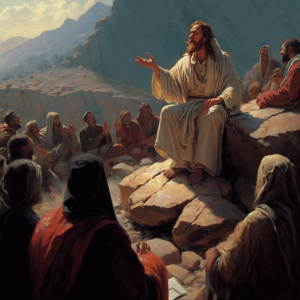3rd Sundaarey before Lent St Andrew’s Milngavie 2025
Today we celebrated the 3rd Sunday before Lent accompanied by Alison.
This Week
Tuesday 10am – Prayer Group in the Garden Room
Thursday 10am – Said Holy Communion followed by coffee in Friendship House.
Readings for next Sunday – 2nd Sunday before Lent – Genesis 2:4-9,15-25 Revelation 4:1-11 Luke 8:22-25
 Today’s readings – Jeremiah 17:5-10, 1 Corinthians 15:12- 20, Luke 6:17-26
Today’s readings – Jeremiah 17:5-10, 1 Corinthians 15:12- 20, Luke 6:17-26
Easter falls very late this year. A fact I find rather annoying, I always prefer as early Easter, perhaps that’s because I’m the sort of person who likes to get on with things. But Easter being later this year means we do have a few Sundays before Lent. This results in the chance to hear scripture that we might otherwise miss. Consequently, this morning we have Luke’s rather challenging version of the sermon on the mount in which other years we would be spared, for it is an unsettling piece of text.
But that is often the nature of Jesus’ ministry.
The passage has a promising start with Jesus teaching the crowds and healing them of various ills. And then we have the wonderful words of Jesus which are always associated with the Sermon on the Mount.
“Blessed are you who are poor,
for yours is the kingdom of God.
Blessed are you who hunger now,
for you will be satisfied.
Blessed are you who weep now,
for you will laugh.” Luke 6:20-22
Imagine how those words would have sounded to those first disciples. How amazing it must have been! Jesus giving real hope and offering compassion to all those people. People who would, in all probability, normally be over looked. But then we hear..
“But woe to you who are rich,
for you have already received your comfort.
Woe to you who are well fed now,
for you will go hungry,
Woe to you who laugh now,
for you will mourn and weep”. Luke 6:24-26
Not so comforting….and how does that speak to us in our context today?
Jesus words “Blessed are you who are poor” are sometimes understood to mean that material poverty is a special source of God’s blessings. Certainly, individuals who take vows of poverty in order to serve God often speak of his blessings and care. But material poverty isn’t automatically a higher spiritual state than material wealth. Jesus is not necessarily commanding us to sell everything and become poor. Rather he is commending a spiritual attitude. The word poor here means someone who’s at rock bottom, desperate. That may include people who don’t know where their next meal is coming from, or people who feel spiritually lost. But it also includes those who feel passionately that life with God at the centre is far richer.
They know their need of God.
They are hungrier for him than for worldly goods. They mourn deeply the sinfulness that hinders their spiritual growth. When they put God first in their lives they are blessed. The word “blessed” is often translated “how happy” The spiritually poor possess the Kingdom of God, in the sense that , they receive God’s eternal love, care, gifts and power to serve him.
Jesus contrasts them with the so-called rich people who are self-satisfied and who focus their lives on material things. They neglect God or move him to the margins of their lives. As a result, they know nothing of his forgiveness. And see nothing of his purposes. When they need him they may not find him. And those who reckon they are spiritually rich who think their relationship with God is solid may find their spiritual life drying up.
Jesus, remember, was speaking to his disciples. A disciple, by definition, is one who is keen to learn and has an enquiring mind.
What Jesus is emphasising here in this short sermon on the plain is our need for God. And more significantly our need for him in whatever our situation we may find ourselves. In good times and bad – harvest and drought, in our lives, our politics, our homes, schools and businesses.
We need our Lord!
But our need for our Lord isn’t simply about advocacy in difficult times, a guide through our earthly life. Our dependence on God goes much further and is more complicated than that. Our dependence on God centres on the resurrection. When Jesus rose from the dead, he demonstrated that all things, even death, can be transformed and renewed. Therefore, the resurrection can bring transformation to our lives now and ultimately, in time, at our death. Without the resurrection the Christian faith makes no sense. The whole Christian hope would be lacking in any foundation. Christ has been raised from the dead. And because Christ is being raised, we will be raised as well.
This was a view that Paul held very firmly throughout his ministry. This is exactly what he is saying to the Corinthians in his letter this morning. He uses the term first fruits to refer to Christ’s resurrection. In other words, Christ is the first in the great resurrection harvest, which will include all people.
“But Christ has indeed been raised from the dead, the first fruits of those who have fallen asleep.” 1 Corinthians 15:20
“Blessed are you who hunger now, for you will be satisfied.” Luke 6:21
